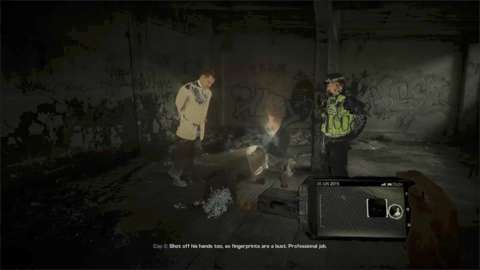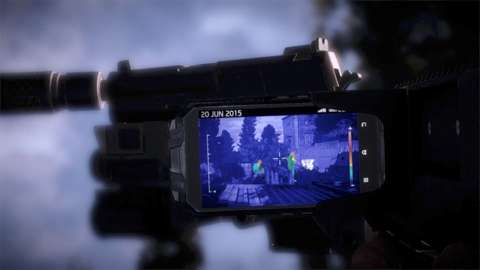Get Even isn't the game I expected it to be. The trailer I saw featured tense, jarring soundscapes, screams, and ominous cuts from crime scenes to mental asylums, giving it a strong horror vibe. There are a few glimpses of guns, suggesting it could be a little more horror action, but it's hard to tell. Something along the lines of Condemned and F.E.A.R. is what I had in mind when I sat down to play the first three hours of the game at a recent press event. I was surprised how wrong I was, but I found myself intrigued by the tone of the game, its fragmented yet carefully curated pacing, its allowance for a variety of personal choices and playstyles, and how interesting the gunplay was. It's a difficult game to condense into a trailer.
Fallout 4 Next Gen Update Comparison Stellar Blade - Hard Mode No Damage Gigas Boss Gameplay Stellar Blade - Hard Mode No Damage Abaddon Boss Gameplay Stellar Blade - (Almost) All Outfits Granblue Fantasy: Relink - New Content Trailer Modern Warfare III - New Season 3 Reloaded Modern Warfare Zombies Update River City Girls 2 - New Playable Characters DLC Reveal!! That Time I Got Reincarnated as a Slime ISEKAI Chronicles – Official Announcement Trailer MEGATON MUSASHI W: WIRED – Official OP “MUSASHI English Ver.” Trailer Gothic 1 Remake | Official Collector's Edition Trailer SaGa Emerald Beyond – Official Launch Trailer Paper Mario: The Thousand-Year Door – Official Switch Overview Trailer
Please enter your date of birth to view this video
By clicking 'enter', you agree to GameSpot's
Terms of Use and Privacy Policy
You play as Cole Black, a gruff mercenary who's setting out to infiltrate a building and resolve a hostage situation. You eventually find a girl with a bomb strapped to her, and are tasked with disarming the charge by punching in a code which can be found elsewhere in the building. Or at least, I assume it disarms. In the spirit of testing the game's limits I purposely punched in an incorrect code, and the bomb exploded.
To my surprise, the story continued. I learned that Cole is experiencing events by way of an advanced virtual reality helmet. An ominous, disembodied voice named "Red" is seemingly the scientist behind this experiment, which aims to replay a number of Cole's memories back to him in order to monitor and achieve clarity on past events. Cole is understandably confused and angry as hell. It all feels real to him, and he's seemingly lost his actual memory so he--and by extension the player--aren't exactly sure when the things happening took place, and whether they even happened as they're portrayed. Hearing conversations between himself and Red were a constant throughout my demo, where Cole regularly cast suspicion on the reliability of what we're seeing. The plot twists and reveals of the game's narrative are definitely the major focus.
The only real clue to the chronology of events is the date on your phone, an object you'll be using constantly as you explore different settings and memories--analysing physical objects with your camera to collect evidence, using an ultraviolet light and thermal reader to uncover secret trails, and using a map app to get around. Physically finding clues, reading notes, listening to audio logs, and solving environmental puzzles are also a large part of the game, and I was pleasantly surprised to find that puzzles offered multiple approaches to their solutions. In one instance I had to decipher a numerical code, and stopped playing to use a real-world notepad to work it out then and there, but later learned that clues to make the process easier can be found, given the time. Another puzzle involved a series of steam pipe valves, which allowed for an alternative and amusingly simple brute force solution if you were observant enough.

While the ominous and dreary environments you're exploring draw comparisons to survival horror games, Get Even's tone rarely dove deep into that end of the spectrum during the demo. Psychological action thriller is probably the best description. Instead of feeling frightened, I felt tense, wary, and on-guard the entire time. I was unsure of who to trust, and approached each new environment and piece of evidence with caution and skepticism. That said, there were a couple of jump scares and some genuinely uncomfortable moments, featuring some memorable and effective sound design.
There were also moments of pure exploratory exposition--I later spoke to one of the game's directors, who mentioned Gone Home and The Vanishing of Ethan Carter as influences--where you would experience the small, personal moments of characters from their past, and get a deeper sense of their current motivations. Environmental and character-driven storytelling are things I enjoy, and I was surprised that a game with a hard-boiled title like "Get Even" featured so much of it. It's like a walking simulator, with guns.

And Get Even has guns. It also has stealth takedowns. They're introduced early on, but it's easy to forget about them after reading handwritten notes and scanning things with your phone for so long. However, the game suggests that killing folks might not always be necessary, as it tries to hangs on your guilty conscience during your first deadly encounter. The map function on your cell phone lets you see enemy vision cones, which makes avoidance an accessible option. The phone's camera also comes into play here, as you can use it to locate and resolve "anomalies" in the environment. Practically speaking, this means that you can sometimes summon additional cover and activate alternative routes through the environment by removing obstacles like grates.
But although the act of shooting felt a little too rigid for intense firefights, using Get Even's signature weapon, the Corner Gun, was always a delight. It's a device that incorporates the thermal reader from Cole's phone in tandem with whatever gun you have handy. It gives you the ability to sidle up to the edge of a wall, bend your gun at a ninety-degree angle around a corner, zoom in, line up a headshot, and take someone out from the safety of cover. It made me re-think my regular notions regarding positioning in combat and allowed for some fun techniques. For example, I could crouch behind a chest-height wall, look directly up at the ceiling, and bend the corner gun to line up shots from over the top without exposing myself.

Combat encounters were usually quite short, and only involved a small handful of enemies, meaning the fun of the Corner Gun never got old in the first three hours. They felt like the natural culmination of tension in the storytelling allowing for quick, adrenaline-filled releases before transitioning to the next phase in the plot. The majority of what we played in Get Even still lay in investigation, exploration, and exposition.
I later spoke to Wojciech Pazdur, one of the game's directors, who categorised Get Even as "first-person action", and compared the game's balance of mechanics with the film Die Hard. "People think of Die Hard as a movie about Bruce Willis fighting terrorists," he said, "but technically speaking, he only kills something like ten terrorists in the whole movie. The story is a metaphor about a guy who’s trying to save his marriage, and the most important thing about Die Hard is him and his wife, whether they'll stay together or not, and the obstacles in his way, including German terrorists."
By the end of my session, Get Even's plot threads, characters, and the conspiracies that wove them together were becoming more visible and comprehensible, but I wouldn't be surprised if the story took a few more unexpected turns. Get Even certainly struck a nice equilibrium between involving me in its complex narrative with both active and passive interactive methods. I never really lost sight of what I was trying to learn when exploring environments for evidence and clues, and the occasional action scenes and puzzles didn't feel out of place. There was enough to keep me in tune with Cole's motivations but still let me feel involved, allowing me to approach them with my own style. It's a very distinct type of game that's perplexingly difficult to boil down into a few words. It's a game with a unique balance of styles and influences that I'm still intrigued by, and looking forward to exploring further.
Get Even is coming to PC, PS4, and Xbox One on May 26, 2017

